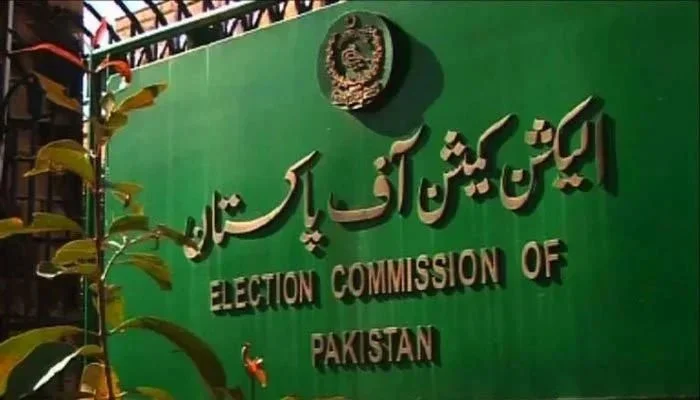- PTI’s counsel argues that an “incomplete commission” is not authorised to decide any case as per the Constitution.
- He says two of the ECP member retired in 2019 but the slots are yet to be filled.
- PTI will file an intra-court appeal challenging the IHC’s order, says Farrukh Habib.
ISLAMABAD: The PTI on Tuesday raised objections against the Election Commission of Pakistan (ECP), claiming that an “incomplete commission” is not authorised to decide any case as per the constitution.
PTI’s counsel Anwar Mansoor was raising objections as two members of the ECP — out of the total four — retired following the completion of their tenures.
Mansoor’s objections came as a three-member bench of the ECP, headed by Chief Election Commissioner Sikandar Sultan Raja, resumed hearing in the PTI foreign funding case today.
At the outset of today’s hearing, PTI’s counsel Anwar Mansoor argued that two of the ECP member retired in 2019 but the slots are yet to be filled.
“The Constitution gives powers to the election commission but not to the commissioner or members,” Mansoor added.
At this, CEC Raja remarked that the Islamabad High Court (IHC) had ordered the ECP to decide the case within 30 days, adding that the ECP wanted to hear the case on a daily basis in line with the IHC’s order.
During the course of the proceeding, PTI’s lawyers expressed disappointment over the observations of the IHC and said that he would complete his arguments in three days.
Meanwhile, the CEC adjourned the hearing till next week.
Talking to journalists outside the ECP office in Islamabad, PTI Vice Chairman Shah Mahmood Qureshi said that the party has no objection to the scrutiny of his party’s funds but the ECP should summon other political parties as well.
“There is nothing in the case. Our all funds are legal,” said Qureshi, adding that the scrutiny committee exceeded its mandate. “We received funds with the cooperation of people but did not loot the national treasury,” he added.
The PTI leader hoped that other parties will also be weighed on the same scale the PTI is being weighed.
For his part, PTI leader and former minister of state for communication Farrukh Habib said that the PTI will file an intra-court appeal challenging the IHC’s order.
On the other hand, Akbar S Babar, the petitioner, told journalists that the IHC’s ruling will take the case to its logical end.
He said that if funding from prohibited sources is proved, then it will affect the PTI and its chairman.
IHC orders to wrap up case in 30 days
On April 14, the IHC ordered the ECP to wrap up the foreign funding case of the PTI within 30 days.
The orders were issued by Justice Mohsin Akhtar Kayani on applications filed by the PTI asking for Akbar S Babar’s separation from the case, the dismissal of the case, and keeping the PTI documents secret.
The PTI had challenged the ECP’s applications seeking the exclusion of Babar, the petitioner, from the foreign funding case. It had also demanded that all records of the case, including the documents requisitioned through the State Bank of Pakistan, should not be shared with Babar, who had filed the case in November 2014.
However, the IHC ruled that the ECP’s role “is of important nature and same cannot be curtailed in any manner”. It noted that the body is a “supervisory, regulatory and administrative body under the Constitution of Pakistan, 1973 to deal with the affairs of political parties, election and its results”.
It also noted that “no restriction could be imposed upon ECP to adopt any process of inquiry, investigation, scrutiny to reach out the mandate of assigned duty in terms of Article 17(3)”.
“If any of the party funding has been received through prohibited sources, it will affect the status of such political party including its chairman, therefore, it is necessary to dig out the truth, even petitioner being a political party is also under an obligation to maintain its dignity and integrity, which has a far-reaching effect in Pakistani society and if any foreign funding has been received contrary to law and mandate of the Constitution, the petitioner has to face the music,” said the judgment.

